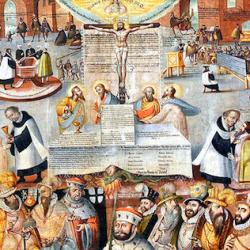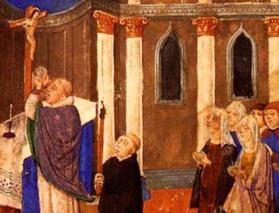The prophet Joel famously describes a locust plague. His is the locustest book of the Bible.
Locusts spell disaster for ancient agrarian peoples. “The land is like the garden of Eden before them, but a desolate wilderness after them” (Joel 2:3); the brown cloud moves across the ground, blackening every green thing. These locusts are a social as well as a natural disaster; they “rush on the city, they run on the wall, the climb into the houses, they enter through the windows like a thief” (2:9). Joel’s locusts symbolize an invading army from the north.
Whether locust or army, this plagues spells cosmic disaster. They shake the earth, make the heavens tremble, and put out the heavenly lights (2:10). The land goes dark, and so does the sky. The locusts are agents of decreation.
Joel’s prophecy threatens famine. Farmers and vinedressers wail (1:11), as well as those who consume or over-consume their products (1:5). But the real threat is liturgical. Israel’s worship depends on material resources—on the production of gain, olive, grapes, animals—bread, oil, wine, flesh. Without this material production, Israel is cut off from Yahweh. Without grain offering and libation, the priests mourn in the house of God (1:8-9; 2:17).
The turning point comes when Yahweh becomes “zealous for His land” (2:18, arguably the chiastic center of the book). In a chiastically formed paragraph, the Lord promises restoration:
A. Zeal for the land, 2:18
B. Grain, new wine, oil, 2:19
C. Remove invaders, 2:20
D. Joy in rain, grain, new wine, oil, 2:21-24
C’. Restoration of what army took 2:24
B’. Eat and be satisfied, 2:26
A’. Yahweh in midst of Israel, 2:27
When Yahweh becomes zealous/jealous for His land, the blackened landscape turns green again (2:22); the empty vats and barns fill up with wine and grain; the Lord sends rain early and late so that the land becomes fruitful. In the light of the earlier focus on temple and priesthood, the restoration of agricultural production implies the restoration of temple worship. Yahweh is “in the midst,” back in His house, welcoming His people to feasts of joy.
Joel 2:23 says that the rain is given “for your vindication” (Heb. litzedaqah) or “for justification.” Rain is a sign that Israel has been judged favorably, an effective sign because rain enables the land to produce the grain, olives, and grapes that are the goods of exchange between Israel and Yahweh, the goods Yahweh offers to Israel at His house.
And then we can tease out sacramental allegories and tropologies. Baptismal rain vindicates and justifies, a sign that the Lord judges the baptized person favorably and, because the rain of baptism falls on the earth of the Adamic person, it is an effective sign that “bears fruit.” Rain produces food, as baptism is the gateway to the table.
More corporately, the existence of baptism in the church is a sign that this community has received the early and late rain from heaven, the rain that makes the “field” of the church fertile (cf. 1 Corinthians 3). A community constituted by baptism is a vindicated community, and that baptismal vindication is sealed by the community’s enjoyment of the bread and wine at the Lord’s table. To be at the table is to be among those who are justified, those for whom the Lord is jealous, those who share in the regeneration of Israel.















